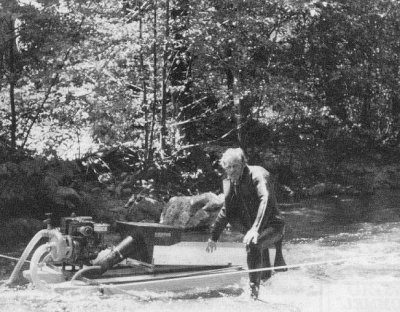 Most miners have a season that is very special. Sometimes because they find a lot of gold, sometimes because of a very special nugget; but they all seem to have one year that stands apart from all the rest. We, too, have such a year, but not for any of the above reasons. Our year stands apart because it really put our love of mining to the test.
Most miners have a season that is very special. Sometimes because they find a lot of gold, sometimes because of a very special nugget; but they all seem to have one year that stands apart from all the rest. We, too, have such a year, but not for any of the above reasons. Our year stands apart because it really put our love of mining to the test.
The year was 1979, and we were especially looking forward to it. We had a new motor- home; but more important to my husband, Bill, we were upgrading from a 2 1/2″ dredge to a brand new 4-incher. Our three teenage sons were staying home, and we were taking our first vacation alone, ever!
We tried to plan carefully, as usual; but due to our three sons, there was always an ever-present need to economize. We decided that we would carry our mining gear in our aluminum fishing boat on its trailer, which didn’t have really good tires. However, after looking them over, we decided they would make just one more trip. That was our first mistake.
Our second mistake was the date we picked to start our vacation. California was in the midst of a record heat wave, and we left home on the hottest day (anywhere in the State) in a decade. By late afternoon, heading up Interstate 5 near Red Bluff, the temperature was somewhere over 120 degrees. We were wilted; the left tire on the boat trailer had developed an alarming bulge; and the auto air-conditioning in our new motor-home had died. We pulled into a campground, showered, and collapsed under the rig’s air conditioner, too tired to even eat dinner.
A good night’s sleep helped, and we were at a tire store when they opened early the next morning. After they replaced the tire, we pulled out onto the main street and headed out of town-so we thought. We hadn’t gone a block when we heard a big “thunk!”, and our new tire went flying past us, up Main Street. I can still clearly see Bill slumping over the steering wheel, saying “Oh, no!..Oh, no!,” as cars and trucks swerved, trying to dodge the tire as it merrily sped down the street. It looked like something from the Keystone Kops ! Then, a glancing blow from a truck sent it spinning crazily off toward the sidewalk. And as I looked up, I saw that it was headed right for a beautiful little church with stained glass windows.
We could only watch and hold our breath as it jumped the curb, crossed the sidewalk, and started up the church steps. One big bounce, then two, and the next would send it over the top and right into the window! But the tire just didn’t have quite enough “oomph” to go over the top, and we gave a sigh of relief as it hit the edge of the top step to bounce back down and into the street where it finally came to rest.
Only then did we notice that traffic had completely stopped, and we had quite a large audience. Bill was really thrilled to have to get out and retrieve the tire and all the lug bolts, apologizing all along the way. Red Bluff was quite small, and the audience obliged by waiting and watching him.
The lug bolts were stripped, but he put it back together as best he could, and we made it back to the store. Bill had a few things to say the whole time he worked, but I wisely kept silent. In such a situation, I have found it is better to not even murmur sympathy.
Although they did not have what we needed to fix it, they managed to get it together well enough for us to limp along the shoulder to Redding, another 33 miles. There, they managed to make the necessary repairs, and Bill bought a replacement for the spare tire on the trailer.
By this time, we had lost what little coolness the early morning held, and we sped on our way in the heat. Our next stop, Yreka, came at about noon, and we quickly picked up groceries, gasoline and propane, and then headed on our way. About 15 miles further, we had to find a large open area back from the road to stop.
Our third mistake was in not making sure they did not overfill our propane tank. (We have found this is common, and can be very dangerous). By now, it was 114 degrees, and we were in the sun, of course. We gratefully climbed back into the rig to resume our journey. But unfortunately it was not for long. Soon, a passing motorist, by honking the horn and pointing back, signaled another problem. You guessed it! The other trailer tire was flat. There was no shade in sight, and I don’t exaggerate when I say that we sizzled each time we had to touch the hot metal of the boat to get what we needed. I stayed out to help as much as I could, but made sure I stayed out of the way, and behind Bill, in case he reached the stage of throwing things. He was seeing so much red by this time I was afraid he might not see me.
The tire-change went smoothly, however; and in another fifteen miles, we had reached our destination to join our friends, Ned and Dori. What a relief it was to relax in the shade, sip a cool drink, and visit.
When we’d finished our news, Ned told us theirs. They had made a deal for us to dredge on a private claim about 10 miles further up the mountain. We excitedly broke camp, and hauled everything up there, where we labored the rest of the day getting our rigs back into the thick trees, in the cool shade. We were going to be here a while, and we wanted it right.
There had been a cabin here at one time, and the cleared area where it had stood would be perfect for campfires at night. We also discovered, off a ways, a “Three- Holer .” For you city folks, that is an outhouse with three holes. Actually, I’d never heard of one, either. It had critters, and it was dirty; but was still sound. Dori and I decided we’d clean it up when we had time. That night, as we sat around a fire, the tension from our trip faded, and the wonderful peace that we always felt when we got away like this descended upon us. It was August, and the days were long. By bedtime, the guys had made plans to get going early in the morning, and be dredging by noon.
In the morning, Bill sprang from the bed, eager to get the day started. Unfortunately, his aim was off a little, and he smashed his knee into the cupboard next to the bed. Ignoring my offer of a band-aid, he quickly donned a pair of shorts and went out to get things ready. In an hour or so he was back. He had added a bee sting to his other knee, and a huge multi-colored goose egg to a shin. Now he was ready for band-aids and medicine.
After I’d done what I could, he put on his wetsuit. His fourth mistake was in not putting his wet suit on first thing in the morning. They are good protection! He then hobbled off to finish putting the dredges into the water with Ned’s help.
When they finished, we took a break for lunch; and as we finished, we had a visitor. It was the miner who had the next claim up the creek, and he was very nice about it, but…Ned and Bill had launched the dredges over the claim line. So they spent the rest of the day moving the dredges and setting up in a new location.
When we arose the next morning, Bill’s cut, sting, and goose egg were surrounded by rash and were inflamed. His fifth mistake was in not watching carefully enough for poison oak. From there, he proceeded right to his sixth mistake. He dredged anyway.
By the next morning it was obvious even to Bill that everything was infected, and his poison oak was rapidly spreading to cover his entire body. Reluctantly he stayed out of the water; we soaked and applied creams and ointments, as he stared at it all, willing it to go away.
Despite all of our efforts, Bill looked much worse the following day, and we were growing concerned. He still refused to see a doctor. Our seventh mistake was to use band-aids and tape, which Bill has always been allergic to. As I tried to remove them to put fresh ones on, each small tug of the tape caused Bill to say “~UGH!!!” The sound was approximately equivalent to the ones they make in a movie when having a leg sawn off without anesthetic. No matter how hard I tried to be careful, each tug brought forth another “~UGH!!!”. To make matters worse, I soon had tears flowing freely from laughing so hard.
Ned and Dori came running to see what had happened now, and when I answered the door with tears running, they were really concerned. As I tried to explain, they became very confused, since Bill had a huge scowl, and was at the same time telling them about the cruel and inhuman torture I was putting him through. Finally, I removed just a small piece to show them (and to shut Bill up), and his words changed to “~UGH!!!” Then they were laughing, too, and Ned insisted on staying to the end to get even for the many things Bill had done in the past.
We decided we’d better leave it the band-aids off, which meant that Bill had to stay indoors to keep dirt out. With that development, and the seriousness of the infection, Bill finally agreed to see a doctor. We went to the hospital in Medford (Oregon) the next morning. The doctor kept his hands in his pockets the entire time he looked at Bill, said he had severe staph infection along with the poison oak. He prescribed several medications, along with many restrictions to keep it from spreading. This really sent Bill into the depths of depression, and it took us several days to get all the soaking, etc., worked out in our small motorhome. But then we came up with a plan to ease his problem. I became Bill’s “surrogate dredger,” and this is how it worked: (Until then, I had always participated in his dredging, but only as a dredge-tender, or by shoveling tailings.) Bill would stand up on the bank, about 30 feet high, and tell me where to dredge, and shout directions, which I was to follow. In most places here, bedrock was extremely shallow, only 2 or 3 feet deep, and I soon found that working the nozzle was actually a lot of fun. It sucked up all the stuff, and then I could fan the crevices and cracks; and most of the time, there would be some gold that I could see and pick up with my tweezers.
It was hard to hear Bill over the dredge engine, and he was frustrated because he could not see very well what I was doing. More often than not, he said that the gold I was recovering wasn’t good enough, and that I should move to a different place. Now this was the very first gold that I personally had ever found on my own, and I had a very special feeling for it. I was most-often content to stay right where I was. Also, one of the things I am not known for is my muscles or athletic ability, and dragging (the water wasn’t deep enough to float the dredge in many places) a 4-inch dredge over rocks is not a fun thing to do. Besides, I always believed he did not sample thoroughly enough when testing.
Naturally, this led to much “discussion,” something we are experienced at, having been married a long time. At times, in fact, I was sorry that we were no longer using tape. I’d have really enjoyed ripping some off. However, I would eventually realize, or be reminded, that I was only a surrogate dredger, and remember that I was supposed to be helping him; so I would usually move. Eventually, however, I lost all my understanding, patience, energy, and enthusiasm, and we gave up that experiment.
The next week, when we weren’t snarling and snapping at each other, Bill read and listened to the radio, and I recruited Dori to help me refurbish the “Three-Holer,” when I needed to get away. We cleaned out the nests, put a spare piece of outdoor carpet on the floor and contact paper down the seats, hung a lantern and fixed the latch on the door. Then we cleaned the path and lined it with rocks. Ned helped me fix a metal poker we heated in the campfire, and I burned “3-Holer” into a piece of picturesque wood that pointed the way. Then finally, the day arrived when Bill could go back into the water. We had four days left for dredging.
We set the dredge up in a deeper pool that he wanted to try, but we developed a problem right away. In dragging the dredge around, one of the pontoons was taking in water, and Bill was too anxious to take the time to fix it right. That was a mistake.
He hit good gold right away, but we were using every bit of hose we had. Each time he’d tug on the hose, the pontoon would settle a little bit deeper in the water. Eventually, the dredge would be in danger of sinking, and he would have to come up to pump it out.
Bill worked a very long day; and when he came out, he did no more than shower, grab a sandwich, and fall into bed. He got up early the next morning, put his suit on immediately, and we went to the creek. By this time, the heat wave was long gone, and it didn’t climb above 45 degrees until the sun came over the mountain, late in the morning. I did not argue, however. He was doing some serious dredging, now; and he was even angrier each time he had to come up to pump the pontoon.
I tried to build a dam under the dredge. But each time he pulled the hose, the rocks would fall, and I had to start over. By early afternoon, I had given up; and when I signaled him to come up about the tenth time, he came up boiling mad. He broke water like a fish on a hook, ripped the regulator from his mouth, and told us all just what he thought of his pontoon, the manufacturers of the dredge, dredging, and life in general. The whole time he was talking, he was shedding his gear; and when he reached the bank, he started pulling in the dredge, and proceeded to break it down.
Our friends quietly faded away, and I found a rock to sit on a safe distance away. When Bill finished, he told me I could pan the concentrates or not, he didn’t care. I did pan them after he went back to camp; and as I took a break before panning the last pan, I sat on my rock in the middle of the creek, and the beauty of the scene struck me, again. I listened to the creek as I watched the rays of sunlight shining through the trees to dance on the water. The black-berry bushes twined among the trees and ripe with big, luscious fruit, hung low over the water, and the air smelled so fresh and sweet I could taste it. The image is as bright today in my mind as when I sat there, and with the image comes the feeling of peace and contentment I felt at that moment.
We packed up that night and started home the next morning. Bill was very silent through the packing and the drive home. About halfway home, I was beginning to get concerned that he was really finished with mining, when out of the blue he said, “Next year.”
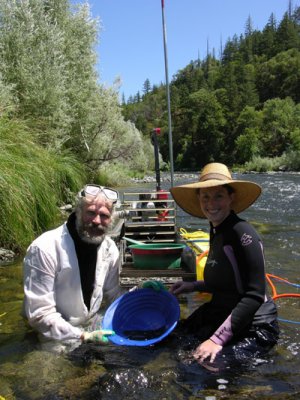 How many of you gals out there are “miner’s widows” ?
How many of you gals out there are “miner’s widows” ?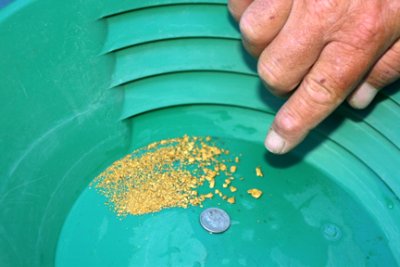 This should tickle your fancy and get the old gray matter moving We, the members of the “Female Mining Sorority”, salute you and respectfully request the honor of your presence at our next meeting.
This should tickle your fancy and get the old gray matter moving We, the members of the “Female Mining Sorority”, salute you and respectfully request the honor of your presence at our next meeting.

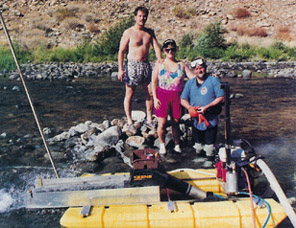 There I was seven feet deep in the Merced River, staring at a human skull. Was this a watery grave for some murdered miner from the 1800’s or an early native Indian from the Miwok tribe of the Sierra Nevada foothills?
There I was seven feet deep in the Merced River, staring at a human skull. Was this a watery grave for some murdered miner from the 1800’s or an early native Indian from the Miwok tribe of the Sierra Nevada foothills?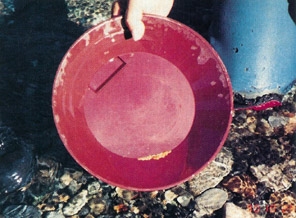 On this particular trip, I was dredging with my father, my Uncle John Bard, and his son Michael. My Uncle John was an experienced diver who also had some experience at gold prospecting. It wasn’t until I had started dredging on the Merced River that I found out about John’s prospecting experiences. During the 1960’s, John had dredged the American River and had done some prospecting in Alaska.
On this particular trip, I was dredging with my father, my Uncle John Bard, and his son Michael. My Uncle John was an experienced diver who also had some experience at gold prospecting. It wasn’t until I had started dredging on the Merced River that I found out about John’s prospecting experiences. During the 1960’s, John had dredged the American River and had done some prospecting in Alaska.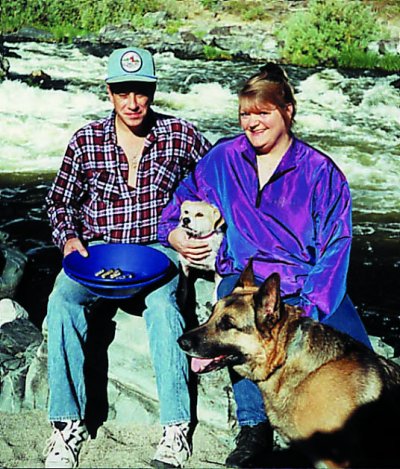 It was spring, and John and I were ready for another adventure on the
It was spring, and John and I were ready for another adventure on the 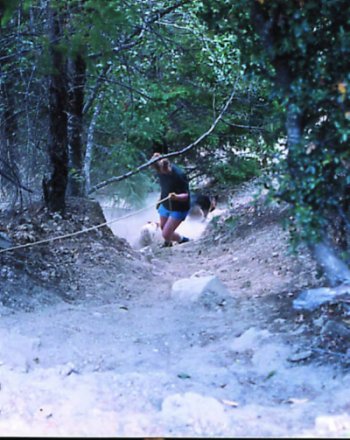 The next day we took our two dogs and climbed down the mountain with the help of a rope tied at the top of the trail.We chose a likely place to start
The next day we took our two dogs and climbed down the mountain with the help of a rope tied at the top of the trail.We chose a likely place to start 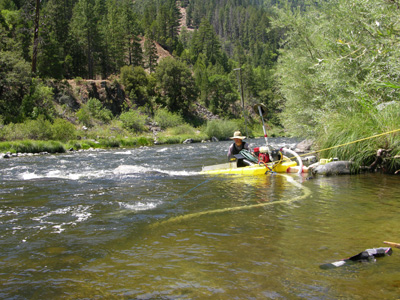 Then, as the rope burned through my fingers again, John (who was still trying to hold onto it) was dragged over the rocks on his stomach. He saw that the dredge was beginning to sink from the strain we were putting on the rope as it fought against the current, and yelled for me to let it go. What a sick, helpless feeling it was to watch our dredge rushing down the river, out of control!
Then, as the rope burned through my fingers again, John (who was still trying to hold onto it) was dragged over the rocks on his stomach. He saw that the dredge was beginning to sink from the strain we were putting on the rope as it fought against the current, and yelled for me to let it go. What a sick, helpless feeling it was to watch our dredge rushing down the river, out of control!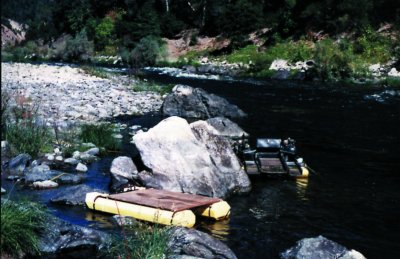 They paddled hard and caught up with it, and pulled it up onto a sand bar on the other side of the river, tying it off on a rock. Thank God for rafters! Without their help, our summer would have been ruined. Our dredge would have surely been smashed up as it went through the next set of rapids, only yards away from where they pulled it out. We decided we’d had enough excitement for the day and went back to our tent camp.
They paddled hard and caught up with it, and pulled it up onto a sand bar on the other side of the river, tying it off on a rock. Thank God for rafters! Without their help, our summer would have been ruined. Our dredge would have surely been smashed up as it went through the next set of rapids, only yards away from where they pulled it out. We decided we’d had enough excitement for the day and went back to our tent camp.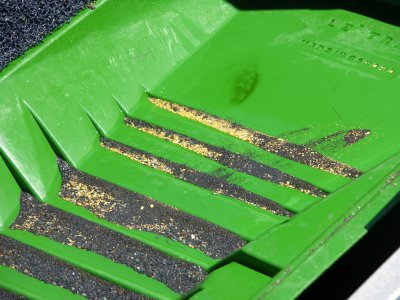 We spent our downtime doing some sightseeing. But after being out of the water for a little more than a month, John was dying to get back to dredging. Every little bump and jar caused him a lot of pain, but he managed to work the nozzle. We finished off the spot we were in, getting good gold right to the finish. That took about a week. But under better circumstances, it might only have taken a day or so. We then moved forward between the next set of boulders. The amount of gold we were finding dropped drastically, and we decided we probably should have dropped further back on the river, instead. The strange currents in this area probably dropped the gold differently from normal.
We spent our downtime doing some sightseeing. But after being out of the water for a little more than a month, John was dying to get back to dredging. Every little bump and jar caused him a lot of pain, but he managed to work the nozzle. We finished off the spot we were in, getting good gold right to the finish. That took about a week. But under better circumstances, it might only have taken a day or so. We then moved forward between the next set of boulders. The amount of gold we were finding dropped drastically, and we decided we probably should have dropped further back on the river, instead. The strange currents in this area probably dropped the gold differently from normal.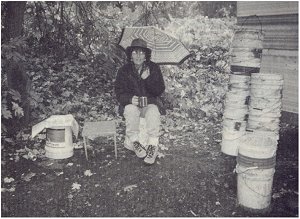 Three months of planning, over a thousand miles of traveling, anticipation of
Three months of planning, over a thousand miles of traveling, anticipation of 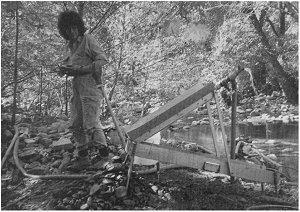 The trip to Columbia was uneventful; but it was a very, very long drive. We finally arrived at the road which would lead us down to the river. As we descended, we saw ahead of us large billowing clouds of smoke coming over the mountain ridge. We could not believe that we had driven all this way and the mountain was on fire! This was
The trip to Columbia was uneventful; but it was a very, very long drive. We finally arrived at the road which would lead us down to the river. As we descended, we saw ahead of us large billowing clouds of smoke coming over the mountain ridge. We could not believe that we had driven all this way and the mountain was on fire! This was 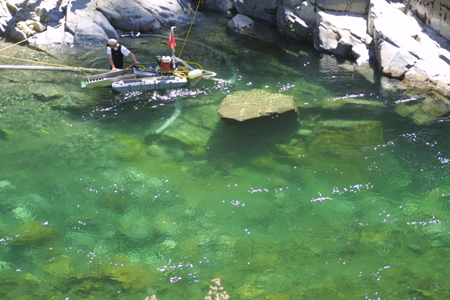 Things were going good and looking better. Yesterday had been a long day, but not as long as I was able to work; about three and a half tanks of gasoline or seven hours. Today, as planned after the gold weigh-up last night, I was at the river early, determined to put in at least a four-tank day . . . and pull my first half-ounce of gold in a day!
Things were going good and looking better. Yesterday had been a long day, but not as long as I was able to work; about three and a half tanks of gasoline or seven hours. Today, as planned after the gold weigh-up last night, I was at the river early, determined to put in at least a four-tank day . . . and pull my first half-ounce of gold in a day!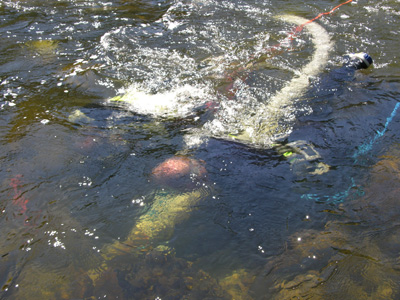
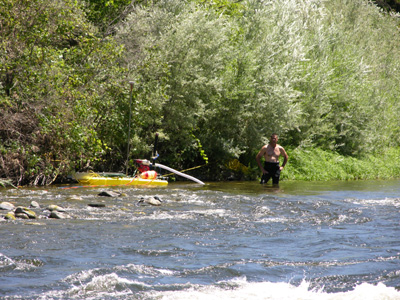
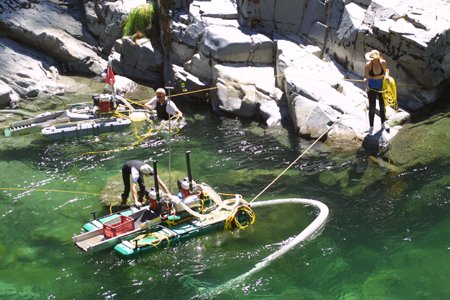 A partner and I were
A partner and I were 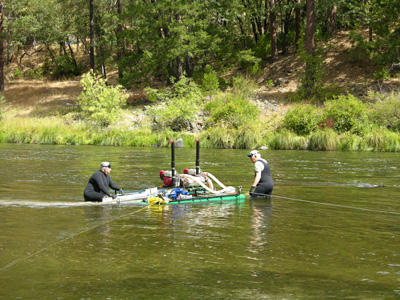
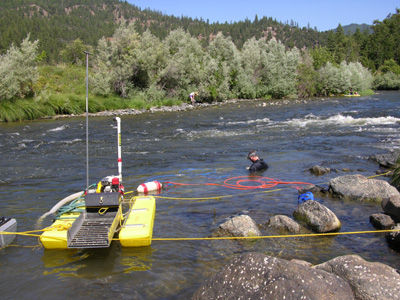
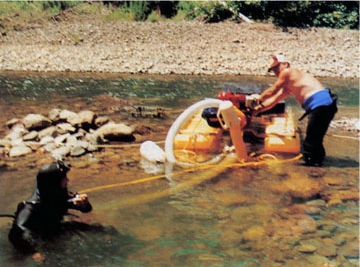 My BH (Big Hubby) and I became interested in
My BH (Big Hubby) and I became interested in 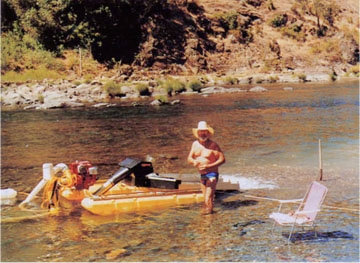
 Most miners have a season that is very special. Sometimes because they find a lot of gold, sometimes because of a very special nugget; but they all seem to have one year that stands apart from all the rest. We, too, have such a year, but not for any of the above reasons. Our year stands apart because it really put our love of mining to the test.
Most miners have a season that is very special. Sometimes because they find a lot of gold, sometimes because of a very special nugget; but they all seem to have one year that stands apart from all the rest. We, too, have such a year, but not for any of the above reasons. Our year stands apart because it really put our love of mining to the test.



